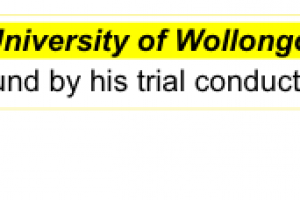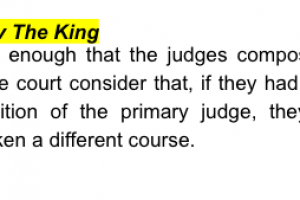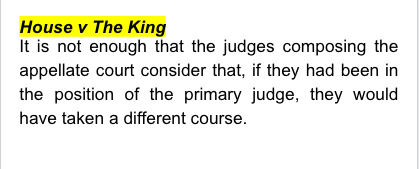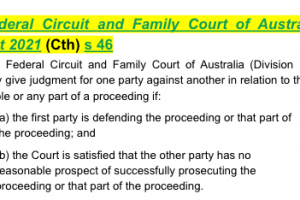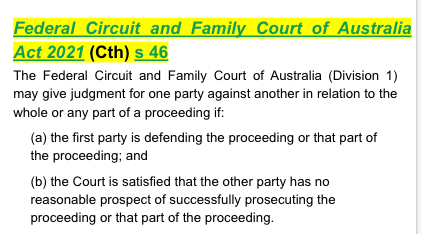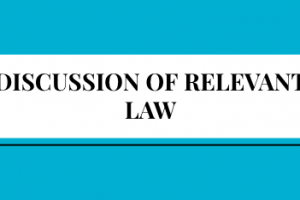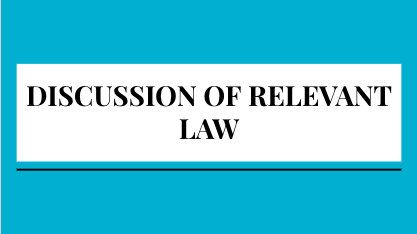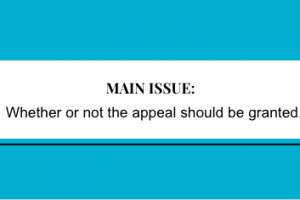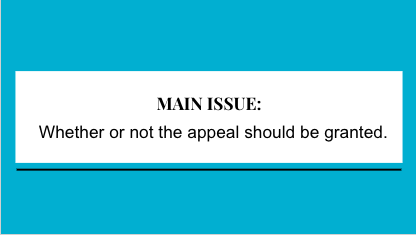- · 4622 friends
Husband Appeals Property Settlement Orders

Delacey & Redwood (No 2) [2022] FedCFamC1A 115 (26 July 2022)

Mr. Delacey (“the husband”) appeals against two final orders made on 8 April 2022 by the primary judge in property settlement proceedings in which Ms. Redwood (“the wife”) was the applicant. The respondent-wife seeks for the appellant husband’s appeal against final property settlement orders to be summarily dismissed. The Court, in determining whether the appeal has reasonable prospects of success, relied upon the grounds argued by the husband.

Facts:
The parties commenced a relationship in 2014, and married in 2016, with their only child being born later that year. Separation occurred around Christmas 2018, meaning that the relationship existed for a little over four years. The wife brought into the relationship a home at Suburb N (“Suburb N”) together with some shares, savings, and chattels, as well as superannuation. The husband brought into the relationship considerable savings, a quarter share interest of a house, some chattels, and superannuation.
Early on in the relationship, a home at Suburb F (“Suburb F”) was purchased in the husband’s sole name. The deposit was sourced from his savings, and the mortgage was in his sole name. Shortly after its purchase, the husband utilised further savings in his name to reduce the mortgage. Suburb F then became the parties’ home. The wife contributed to the mortgage repayments in respect of Suburb F until she moved out at separation.
The husband has been solely responsible for all costs associated with Suburb F. Property and parenting proceedings between the parties proceeded to trial, with final orders being made in them by a Federal Circuit Court judge on 23 September 2020. Those orders required the husband to pay the wife $224,650. He did not do so in the required time, such that penalty interest and costs were ordered, which saw the ultimate total owing $230,970.78. That sum was paid on 1 April 2021, but subsequently, on 8 September 2021, the husband’s appeal against the 23 September 2020 orders was allowed, and the property proceedings were remitted for rehearing before another judge.
At the rehearing both parties regarded those monies as the wife’s, even though the order under which they had been transferred to her had been set aside. The rehearing took place before the primary judge and resulted in the orders of 8 April 2022 from which the husband has appealed.

Issue:
Whether or not the appeal should be granted.

Applicable law:
Federal Circuit and Family Court of Australia Act 2021 (Cth) s 46 - provides that the Federal Circuit and Family Court of Australia (Division 1) may give judgment for one party against another in relation to the whole or any part of a proceeding if:
(a) the first party is defending the proceeding or that part of the proceeding; and(b) the Court is satisfied that the other party has no reasonable prospect of successfully prosecuting the proceeding or that part of the proceeding.


Analysis:
As a consequence of the husband having paid the monies due to the wife under the 23 September 2020 orders, at the second trial the property interests in the parties’ names were materially different from that which had prevailed at the time of the first trial. The husband then contended that the wife should transfer those monies back to him, and pay him a further $70,259.22 so as to achieve a 50/50 division of the net pool.
He therefore contended it was just and equitable to alter the parties’ property interests. Although this ground, on its face, now seeks to revisit that, the husband is bound by the conduct of his case at trial. The husband contended that the hearsay evidence was as to his having drawn down amounts from the Suburb F mortgage, but how that is impermissible hearsay is unclear, and more, it does not appear that any objection was made to the tender of the bank statements which contained this evidence.
He sought that there be no payment by him (in the sense the monies paid under the first orders should be wholly repaid, together with a further sum being paid to him) but he made no argument before the primary judge that there should be any split of superannuation if some lesser payment than that required under the 23 September 2020 orders was ordered. The primary judge was well aware of the information proffered by the husband, and hence considered it, but declined to rely on the tables as there was missing source material. The conclusion that the husband’s contributions to Suburb F were not as great as he claimed is easily demonstrated by the unchallenged double counting of the husband’s contributions to the mortgage identified by the primary judge.
Conclusion:
The Amended Notice of Appeal filed on 9 June 2022 is dismissed.



